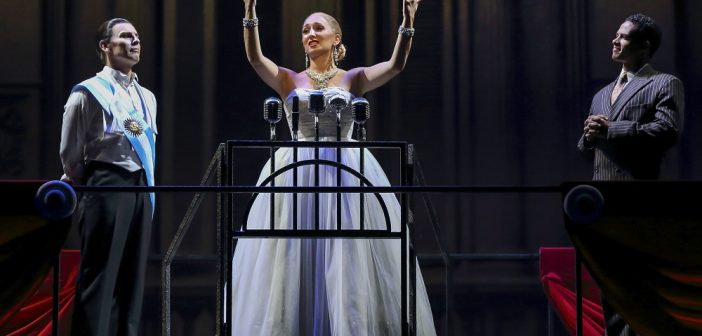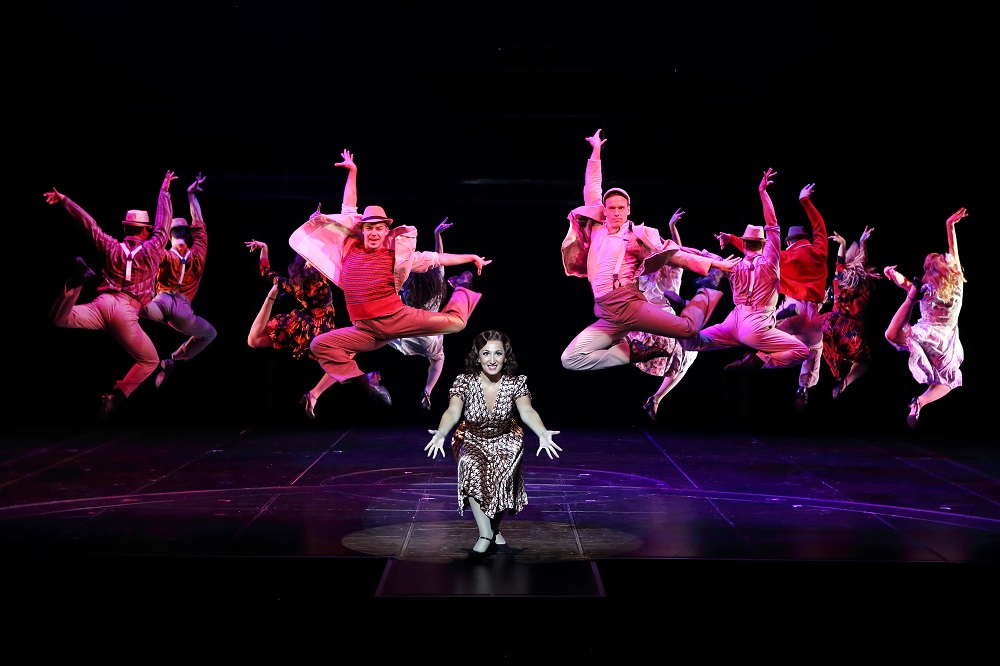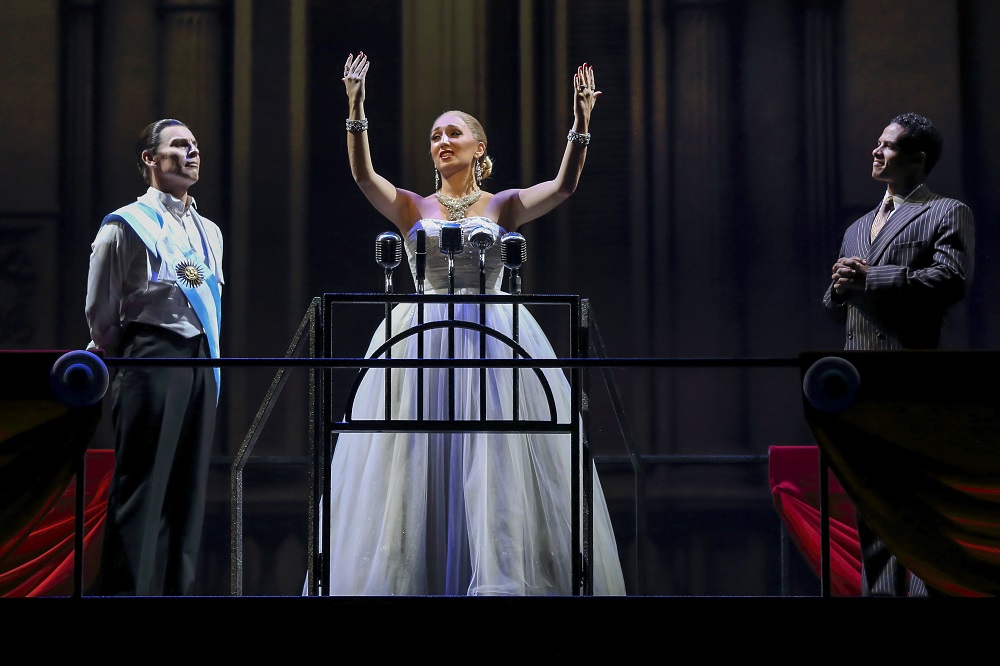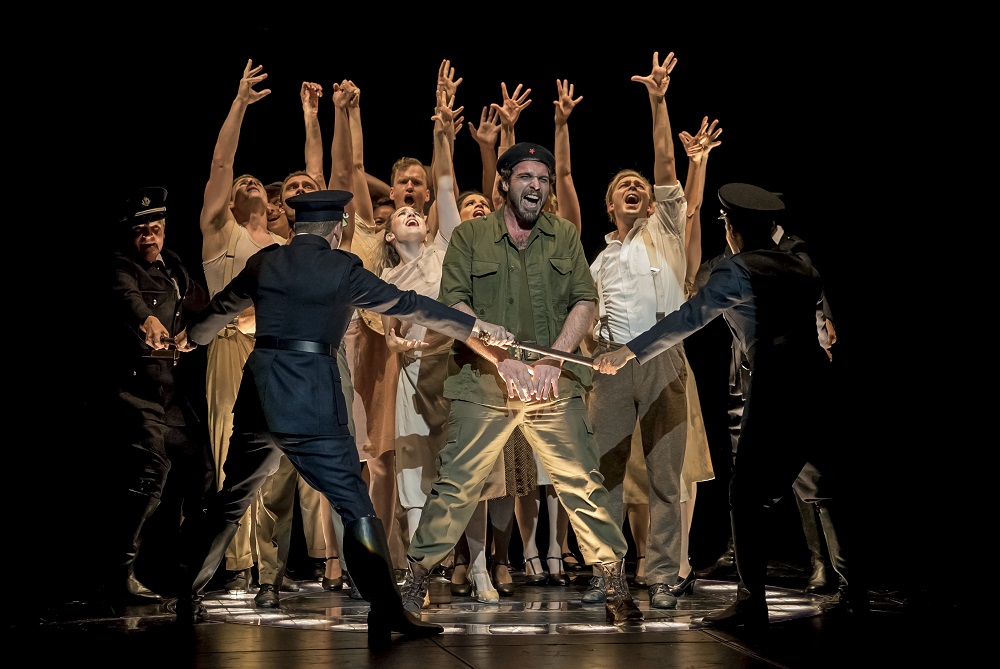Evita the Musical finally descends on our shores after being first performed at London’s West End 40 long years ago, and some 22 years after the movie version starring Madonna and Antonio Banderas. Was it worth the long wait for this multi-award winning musical?
The musical traces the life of 15-year-old Eva Maria Duerte (later known as Eva Maria Duerte de Perón, or more popularly referred to as Evita) seeking to leave the small town of Junín for the bright lights of Buenos Aires, her rise to fame on the coattails of influential men and her crowning achievement as First Lady of Argentina before her eventual demise at the young age of 33.
Though never officially credited as such, the musical is purportedly based on a biography of Eva Perón drawn from interviews with anti-Peronists. This would not be surprising as the musical portrays a rather strong bias against Evita and to a lesser extent, her husband the late Argentinian President Juan Perón. This is best encapsulated by the whimsical number High Flying, Adored – a song dripping with sarcasm and laced with bitter criticism and a sense of foreboding. Against six long verses of angst targeted at her, Evita only gets one verse in defence, and even then a rather mild response with an almost conciliatory tone.
Peronists have come out in force to discredit the accounts on which the musical is purportedly based. For instance, you will see in the musical that Evita bumps into tango singer Augustin Magaldi (the first man she was alleged to have used in her heady ride to the top) at a charity fund-raiser where she first meets Juan Perón. Detractors insist Magaldi had already died by the time of the fund-raiser so that could never have happened.
So where does this leave us? Is the musical an accurate account of the life of Evita? Or just a grand dramatization based loosely on events? Or a little bit of both?
Who was Evita?
To truly understand and appreciate the musical, one has to first uncover who Evita truly was. What has this “backstreet girl” done to capture the imagination of millions of people in Argentina and around the world, including long after her death in 1952.
The enigma that is Evita is difficult to understand. It depends in part on whose narrative of her life you listen to – that of the adoring descamisados (‘shirtless’ labourers) in Argentina, her husband Juan Perón whom she helped cement power, the generals scheming to get rid of her, the sceptical Che Guevara, or herself – and which you choose to believe. Is she really the conniving opportunist the narrator Che would have you believe, someone bent on seeking her own fame, wealth and interests? Or as Evita would persuade you, that she was simply one with a chequered past but who truly loved and cared for the masses from whence she came? As with much of life, the lines are blurred and the truth probably lies in between.
Consider this for a moment – for one without an official title, Evita was given a state funeral in 1952, something traditionally reserved only for heads of state, with eight people being crushed to death and 2,000 having to be treated in hospitals for injuries amongst the throng that rushed to mourn her death and see her body. The chorus girls chant repeatedly Santa Evita (Saint Evita) in the musical. It gets you wondering about the mystique of a lady with humble beginnings who managed to work her way into the national consciousness in perhaps even more dramatic effect than the modern-day saint Mother Theresa did in India.
As Madonna once said about her research into the life of Eva Perón in preparation for her role in the movie, the people she met in Buenos Aires were either completely for Evita or completely against her. Madonna herself had to think about where the truth was in all of this.
Although she is credited as having worked tirelessly amongst the poor and leprous, categorising Evita as a saint might be a stretch. The Eva Perón foundation she founded to aid the poor has been accused of being nothing more than a money laundering unit. The musical certainly does not shy away from showcasing Evita with all her flaws. Yet despite all that, she manages to endear and draw you to herself and her cause with such a simple passion and disarming sincerity. Like you and I, Evita was probably both saint and sinner all wrapped up in one beautiful, complex character.
The Musical
The best of musicals, like Les Misérables and Miss Saigon, are premised on historical events dramatised with a generous dose of romance, action, intrigue and of course, great songs. It is no different with Evita with memorable tunes like Another Suitcase in Another Hall and You Must Love Me and the perpetual crowd favourite Don’t Cry for Me, Argentina.
Isabella Jane conveys perfectly the sadness and sense of resignation in Another Suitcase in Another Hall as the mistress ruthlessly dispatched by Evita in her climb on top, I mean to the top, with Juan Perón. She reminds me of Éponine in Les Misérables – the indispensable underdog in musicals that the audience can identify and empathise with. It’s a pity her character isn’t given more opportunity to be developed beyond a one-song performance. But that is perhaps apt and rather deliberate for a character who isn’t even given a name to begin with and is probably used to symbolise the nameless and faceless beings used and discarded along the wayside by the elites in their ruthless ascension.
You Must Love Me won the Oscar for Best Original Song at the 69th Annual Academy Awards. It’s easy to see the song as merely a heartfelt plea to Juan Perón, as Evita slips away in her fatal illness. The passion and conviction in the song suggest to me however that she is actually imploring the people of Argentina to never cease their love affair with her. Either way, it’s a simple but powerful song that conveys the barest of human emotions – the conflict between one’s insecurities and the desire to be accepted.
The goosebumps moment of the night still belongs, however, to the iconic balcony scene where Evita, played by Emma Kingston, belts out the iconic anthem Don’t Cry for Me, Argentina. As her voice rises and falls with the crescendos in the song, you feel your heart moving along in rhythm and your hair literally on end! Kingston’s stirring rendition is a masterclass in not over-singing it as some are wont to do in musicals.
The character who steals the show is Che – the snarky Greek chorus observer of Evita’s life who seems bent on a one-man crusade to discredit her. His brooding sarcasm throughout the show acts as a brilliant counterfoil to the extreme displays of emotion by everyone else. Played by the wonderful Jonathan Roxmouth, his singing is soulful and well controlled. Even though the show is clearly about Evita’s life, it is Che who carries the whole performance as the common thread through the various disjointed parts.
For those confused by what the ‘Cuban’ revolutionary Che Guevara is doing in a show about the Argentinian First Lady, Che was born and raised in Argentina and his life would have intersected with Evita in that he grew up under the Peronist regime before leaving for Cuba in his twenties. As an informal slang for “Hey” or “Friend/Mate”, the word “Che” also conveys the everyman nature of the character, as you would see in Che appearing variously as a waiter, janitor, reporter, etc in observing Evita’s every action.
The verdict
Although not quite in the same stratosphere as my all-time favourite Les Misérables, Evita more than manages to hold its own with infectious songs and a powerful story. One drawback with the musical is that it is rather flat emotionally throughout the show save for the balcony scene so it is difficult to engage and even feel for Evita when she is dying. That is, however, a function of the story and not the fault of the performers.
What I do admire and applaud about the production is that in trying its best to give an historical account of the life of Evita, it presents a fascinating insight into a crucial period in the history of Argentina. It does not shy away from informing you, for instance, that Evita’s body went missing for 16 years, a seemingly ‘trivial’ side story that you’d have thought would not have made its way into a musical rendition of her life. That by itself is good reason for you to catch this musical while you can. You will go away feeling like you learnt something.
There is also that elusive intimacy that you can only get from watching a live performance. The comic timing when Eva sings the line “We’ll … you’ll be handed power on a plate” in the song A New Argentina is something that you just can’t get from the movie version.
So yes, absolutely worth the wait. But don’t just catch the musical; use this as an opportunity to learn more about the history and culture of a country that many of us have little knowledge of. And of course, discover the elusive and enigmatic Eva Perón.
Evita is playing now at the Mastercard Theatres at Marina Bay Sands until 18 March 2018.










